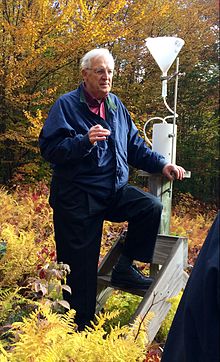Gene Likens
| Gene Likens | |
|---|---|

Gene Likens, 2015
|
|
| Born | Gene Elden Likens January 6, 1935 Pierceton, Indiana |
| Nationality | American |
| Fields | Ecology |
| Institutions | Dartmouth College, Cornell University, University of Connecticut, University of Uppsala |
| Alma mater |
Manchester University University of Wisconsin–Madison |
| Known for |
Hubbard Brook Experimental Forest Institute of Ecosystem Studies |
| Notable awards | Royal Swedish Academy of Sciences, Royal Danish Academy of Sciences and Letters, Austrian Academy of Sciences, National Medal of Science, BBVA Foundation Frontiers of Knowledge Award |
| Spouse | Phyllis Irene Craig Likens (1951-2014) |
Gene Elden Likens (born January 6, 1935) is an American limnologist and ecologist. He co-founded the Hubbard Brook Ecosystem Study at the Hubbard Brook Experimental Forest in 1963, and founded the Cary Institute of Ecosystem Studies in Millbrook, New York in 1983.
A leading pioneer in long-term multidisciplinary ecological studies, Likens examines energy flow and biogeochemical flux models in the ecosystems of forests, streams and lakes. Likens is best known for leading the team of scientists that discovered acid rain in North America, and connected fossil fuels with increasing acidity of precipitation. In addition to its scientific impact, this work has influenced public debate and governmental policy, particularly the United States Congress's Clean Air Act Amendments of 1990.
Gene Likens was born in Pierceton, Indiana. Likens received his B.S. in zoology at Manchester University (North Manchester, Indiana) in 1957, followed by his M.S. in zoology in 1959 from the University of Wisconsin–Madison. He received his Ph.D. in zoology in 1962, also from the University of Wisconsin–Madison, for his thesis on Transport of radioisotopes in lakes.
Likens was an instructor and associate professor at Dartmouth College from 1963 to 1969. In the 1960s, Likens did early work in the dry valleys of Antarctica, examining the thermal structures of Lake Vanda and Lake Bonney.
...
Wikipedia

